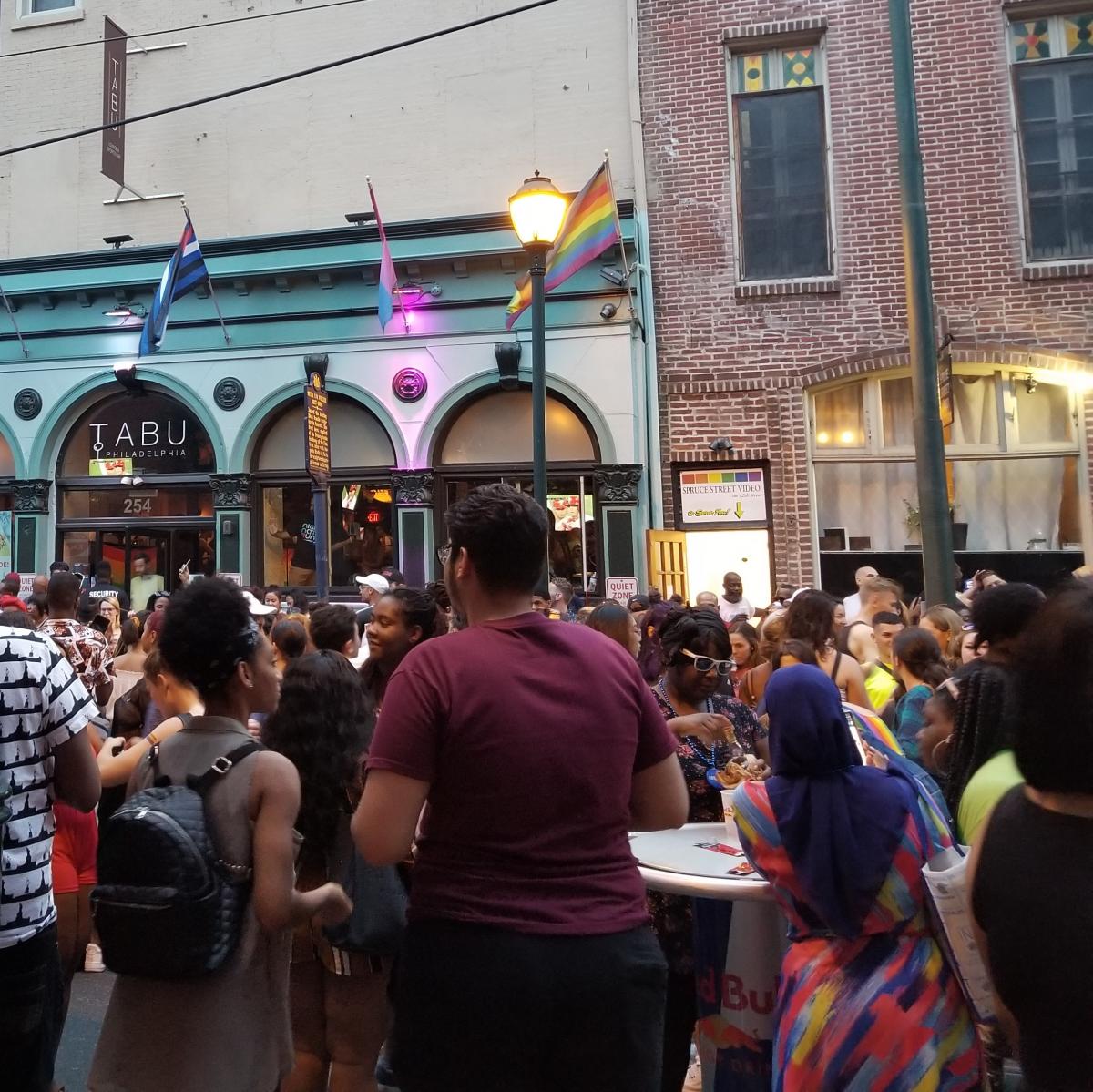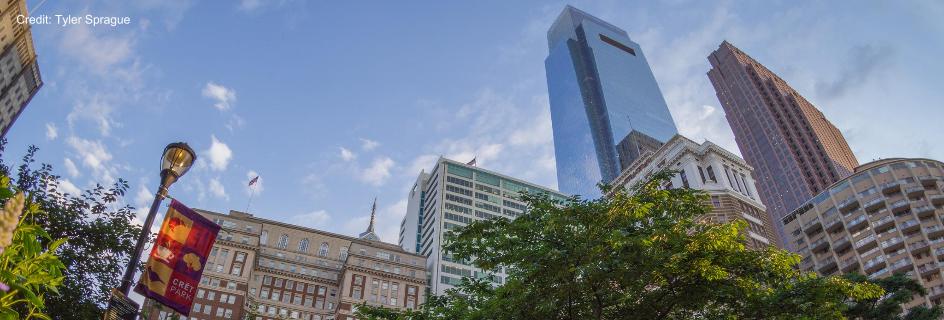- About GPA
- Global Events
- GLOBAL NEWS FROM PHL
- Global Directory
- World Heritage City
- Sustainable Development Goals (SDGs)
- Global Philadelphia Role on Sustainable Development Goals
- Completed Sustainable Development Goals
- SDG#1: No Poverty
- SDG #2: Zero Hunger
- SDG#3: Good Health & Well-Being
- SDG#4: Quality Education
- SDG#5: Gender Equality
- SDG#6: Clean Water & Sanitation
- SDG#7: Affordable and Clean Energy
- SDG #8: Decent Work and Economic Growth
- SDG #9: Industry, Innovation, and Infrastructure
- SDG#10: Reduced Inequalities
- SDG#11: Sustainable Cities and Communities
- SDG#16: Peace, Justice and Strong Institutions
- SDG#17: Partnerships for the Goals
- Press
Home ›
Pride at 50: The Other Side of Stonewall
Posted on June 12, 2019

On June 7th, I had the pleasure of attending the 2019 Philly Pride Kick-Off Block Party. The block party marked the official start of Pride weekend here in Philadelphia, a whole weekend dedicated to celebrating the LGBT community, culminating in the annual LGBT Pride Parade.
I normally don’t participate much in Pride, as I’m not one for crowds, but this year is special because it is the 50th Anniversary of Stonewall and I wanted to be a part of it in some way.
 The Stonewall Riots were the beginning of the modern LGBT Rights movement and, as I’m walking through this gathering of people playing soccer, riding a mechanical shark, and dancing and drinking to Lady Gaga and Beyoncé in the middle of 12th and Locust Streets, I can’t help but marvel at how far we have come in fifty years and, specifically, how much has changed in the last eight years alone.
The Stonewall Riots were the beginning of the modern LGBT Rights movement and, as I’m walking through this gathering of people playing soccer, riding a mechanical shark, and dancing and drinking to Lady Gaga and Beyoncé in the middle of 12th and Locust Streets, I can’t help but marvel at how far we have come in fifty years and, specifically, how much has changed in the last eight years alone.
Back in the 2000s, I found it hard at times to be hopeful for change. I worried about what my future could look like trying to navigate a queer identity in the context of black womanhood, which gave new meaning to the phrase, “three strikes, you're out.” As I was coming of age during my teenage years, it seemed like the LGBT community from a political standpoint was just trying to keep our heads above water as it seemed like every state, except Massachusetts, was trying to ban same sex marriage, same sex parenting, etc.
In 2006, Congress tried to pass the Federal Marriage Amendment, which would have had the U.S. Constitution define marriage as between one man and one woman, as if the "Don’t ask, don’t tell" Policy and the Defense of Marriage Act weren’t bad enough. The worst for me was the passage of Proposition 8 in California, which was proposed during the same night the country elected its first black president. My whole family was overwhelmed with excitement for this historical moment because none of us thought we would see a black president during our lifetime. Unfortunately, I couldn’t fully embrace that feeling as the passage of Proposition 8 cast a pall over everything because “as California goes, so goes the nation.” If same sex marriage couldn't become legal there, then it seems to be little hope for the rest of the country.
Even though the political situation here in the United States left a lot to be desired, I can’t say it was all doom and gloom. From a cultural point of view, there was a sense of promise in the air as this revolution was being televised. In 2003, Showtime launched The L Word, the only show of its kind at the time dedicated to the lives of LGBT women who were living full and actualized lives. Before The L Word, the closest thing to a lesbian themed show was Xena: Warrior Princess (1995) and those female leads never even admitted to being gay, it was pure subtext. I was too young to watch The L Word during the initial run of its first five seasons so the first show I watched with a gay female main character was South of Nowhere. Launched in 2005 by Nickelodeon, a children’s network, it was a teen drama that centered around members of the Carlin family, specifically their daughter, Spencer, and her romance with her best friend, Ashley. The show sparked controversy before it even aired because, to my knowledge, it was the first TV14 rated show to have homosexuality as its central plot point that wasn’t a one-off afterschool special. Thankfully, Nickelodeon did not relent, and the show went on to last three seasons, the standard for teen shows at the time.
In the online world, there was AfterEllen.com, which, at its height in the late 2000s and early 2010s, was the premiere site for LGBT women as both a community space and a medium for entertainment. In that virtual space, I also discovered film/tv shows that I didn’t even know existed. It was there that I learned about classic lesbian/bi films, such as Desert Hearts (1985), The Incredibly True Adventure of Two Girls in Love (1995), But I’m a Cheerleader (1999), and other tv shows that featured lesbian/bi women in a prominent way, including Sugar Rush (UK 2005), Hand aufs Herz (Germany 2010), Exes and Ohs (US,CA 2007). While I admit a lot of what I consumed was mediocre and awful (Claire of the Moon [1992] is the worst film I have ever seen), I was still glad that these stories existed, even if most of the stories being told were those of upper income white women, because at least there was a show or a film representing the LGBT community. It feels good to be told that your truth, even in the smallest of ways, is just as real as anyone else’s that it belongs not only to you but to others like you.
I believe Janet Mock, transgender rights activist, said it best in her 2014 memoir: “I believe that telling our stories, first to ourselves and then to one another and the world, is a revolutionary act. It is an act that can be met with hostility, exclusion, and violence. It can also lead to love, understanding, transcendence, and community.” – Janet Mock, Redefining Realness: My Path to Womanhood, Identity, Love & So Much More
Fast forward to 2019, and so much has changed. The political malaise of the 2000s gave way to the revolutionary changes of the 2010s with the end of the "Don’t ask, don’t tell" Policy in 2011, the repeal of the Defense of Marriage Act in 2013, and the legalization of same sex marriage in 2015. There are now so many LGBT shows and characters that it’s hard to keep track of, let alone watch, all of them. All these changes seemed to have happened overnight but in reality these victories were decades in the making, whose path was laid by the love and loss of those who were brave enough to walk outside their front door everyday as their authentic selves.
As we celebrate Pride Month, we can be proud of how far we have come these past 50 years, as we have gone from riots to block parties, parades, and so much more. But, in the midst of celebration, we should stay conscious of the fights that still haven't been won. The transgender community is facing political and social challenges both outside and within the LGBT community, trans people, especially those of color, are more likely to be murdered then any other demographic in this country. Internationally, LGBT people in countries like Russia, Egypt, Uganda, etc., are still fighting for their right to simply exist in the world. We have come far but we still have places to go.
One final note, if you missed this year’s Philly Pride Parade and still want to see it, the parade will be televised for the first time in history by 6ABC on June 30th at 1:00 p.m.. Happy Pride Month!
Article written by Bianca Robinson on behalf of Global Philadelphia Association







